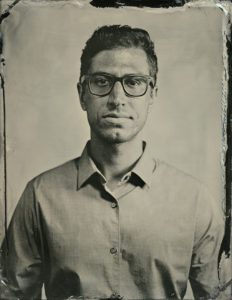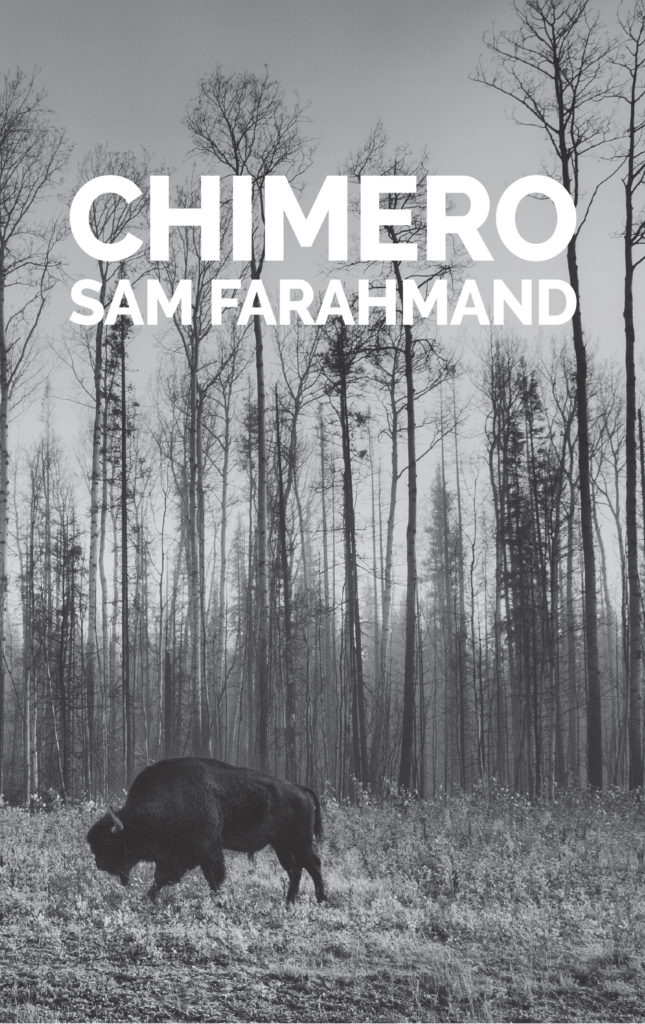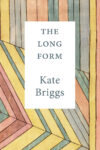 Sam Farahmand’s Chimero (drDoctor, 2020) reads with the kind of deep perceptive voice of someone worrying and wondering and dreaming and not-dreaming because of all the worrying. It is a novel about in-betweens, about telling yourself not to doing something, and then using a double-negative to give yourself permission. It captures something generational in its exploration of fear and anxiety and wanting to be both entirely yourself and entirely outside of yourself. I had the opportunity to have an extended conversation with Sam about his novel, the act of writing, and how to navigate the way of being forever in-between things.
Sam Farahmand’s Chimero (drDoctor, 2020) reads with the kind of deep perceptive voice of someone worrying and wondering and dreaming and not-dreaming because of all the worrying. It is a novel about in-betweens, about telling yourself not to doing something, and then using a double-negative to give yourself permission. It captures something generational in its exploration of fear and anxiety and wanting to be both entirely yourself and entirely outside of yourself. I had the opportunity to have an extended conversation with Sam about his novel, the act of writing, and how to navigate the way of being forever in-between things.
Devin Kelly: You have a line in an essay for LitHub where you write: “I worry my identity for so long has been in trying to not have one, somewhere in between my words and my worst, I’m no longer so sure who I’m not.” When I read Chimero, I thought about this uncertainty, and this longing for worst-ness, and for bearing witness to so much of the worst-ness in the world and others. Where does that desire come from, to live in that state of in-between?
Sam Farahmand: First the worst feels like the best place to start this interview – if you don’t mind me already introducing another superlative – and again, thank you for reading and thinking on Chimero, but yeah, I suppose I’m always drawn to work that explores the in-between, because I think that’s where most of our lives actually take place. It seems like everything today always has to be the most superlative something. At least, if it’s going to get any attention, it has to be the best or the worst of whatever it is. We’re always playing and playing up these parts of who we are with our polished profiles that don’t acknowledge the grayness of who we wholly are. As for my own identity, which at its most identifiable is one of those hyphenated Americans, I think I’ve always been interested in the in-between because of feeling like I am living in between worlds and words, so while the narrator of Chimero is unnamed and the essay for LitHub was all about feeling unidentifiable, it’s probably because I’m looking for the ness-ness of things lost in all the est-nesses.
Hah, I love that. The ness-ness. There’s something I’m drawn to in all artists that search for the essential. One of my favorite lines of poetry is by Larry Levis, when he writes: “Most / Of my decisions have been wrong.” It taps into this understanding that, in this moment, perhaps, nothing is right. And I think your narrator in Chimero vibes with that, as well. It’s not nihilism, but a kind of deepened perception. Does that make sense?
Wow, what a wonderful line. And yeah, essential is a good word for all of this. I think you’re right that it’s not nihilism, and it’s definitely not enlightenment either – though those two seem to be mistaken for each other a lot – but it must be that search for the essential. Words like most and wrong and nothing and right are frighteningly final, which must be what makes decisions so difficult for the narrator in Chimero, but then I think the deepened perception there is in seeing the absurdity of the situation we’re all in together, for better or worse, and still trying to make the most of it.
I hadn’t read that poem by Larry Levis before, but, since you shared it, I’ve been thinking about that line a lot. Thank you for that, and also as a side note, I do find it funny that, of all the artists, it feels like poets always seem to have to explain themselves the most. Maybe that’s what happens when everything is stripped down, as it can be in a good line, to the bare essentials.
As people will probably tell, we’re having this conversation over the course of weeks, and looking at your answer now, particularly the notion of the “absurdity of the situation we’re all in together” – well, it takes on a different meaning. I can’t help but think of your narrator in Chimero, whose search for the essential, as you say, feels like a proper way of assessing reality in this moment, when everything feels so final. I don’t know if fiction is for anything, but I do know that the most compelling fiction does that for me – it offers a new way of seeing the world. Do you agree?
Oh yeah, that’s true for me too, and also, I agree with not knowing if fiction is for anything. Yeah, at its most compelling, fiction can be both timeless and timely – thinking even of how we’ve just been talking over the course of weeks and how much has already changed in our words – fiction can give meaning to the world and fiction can make sense of the world, but then, because it is fiction after all, it also makes a good case for questioning whether anything is for anything.
I suppose I trust the not-knowing more than anything though, and have always been drawn to work that assesses one’s reality by really questioning one’s reality, because there isn’t anything as real for me as wondering about one’s reality. Maybe that comes from thinking about thinking too much, but I think with my own work I’ve also just been trying to trust that feeling of not-knowing while trying to get closer and closer to consciousness, and maybe that’s because the fiction I find to be most engaging for me always feels like a shared consciousness, the kind that offers a way of assessing reality in the moment and acknowledges the absurdity of the situation we’re all in together.
Because it all feels like it’s a part of the same thing to me, so even with what I try to do, it always feels like the lines that come to me are something that is just passing through, and even if I don’t write something down, it’ll be written down somewhere else by someone else in some other way that’s still the same, which I think is why the art I always find most compelling seems to be a part of me I had yet to find.
I love that. I think it’s the same with writing, too, maybe? I’ve always felt my experience writing something I am proud of coincides with that feeling of having discovered something of myself in the process of writing it, rather than trying from the outset to say a thing. And maybe discovered is the wrong word. Maybe it’s more like unearthed. Either way, I find the writing I love my own the most is the writing that surprises me in the act of writing it.
Yeah, I agree with this too, I mean, another thing I’ve been thinking about a lot lately is that writing seems to be this strangely simultaneously selfless and selfish act – at least more so than anything else I know of – so with that in mind, when I think about how someday my writing will mean nothing to anyone and how someday my writing might mean everything to someone, then I think it can for the time being sit somewhere between those two things and maybe still mean something to me. Though that, I suppose, is more so thinking about what happens to the writing and the writer after the unearthing – again, a good word for a feeling – because I also agree the writing I find most moving is what surprises me in the act of writing, and I think that’s something a reader can feel too. When it feels like we’re in this together.
I like that. It’s funny, that for such solitary acts, both writing and reading often call for a sense of communion with someone (or many someones) else. The outcast, the misfit, the wanderer, the introvert – I have been one or all of these at some point in my life – can and do find their home in the act of reading or writing a book.
Yeah, it feels archetypal, or like different words for the same word, though kind of circling back, I think that’s why I always find myself drawn to work that looks inward, questioning one’s reality and deconstructing one’s identity, rather than work that is plotting or projecting, though that seems to always be the contemporary standard, because the looking inward, counterintuitively enough, is the connective tissue for many someones, particularly through time. For me it might go back to really liking that one line about the kingdom of God being within – and again, a good word for that feeling in communion – but yeah, it’s like, I don’t need to hear what the pharisees have to say. I think that’s why I tend to trust what readers of books think about books more so than what writers of books think about books – no offense to you and me being considered writers of books.
That’s such an interesting answer. It’s why I’m still so often almost childishly disappointed when writers whose work I admire end up rubbing me the wrong way in person, or wherever. It’s like – I still want to believe that writing is magic, that it is a kind of communion with something spiritual, or however you want to call it. But in the end, maybe it is just simply ordinary. Which then means that the spiritual – that kingdom of God – is also ordinary. I wish more was made of ordinariness these days.
Oh yeah, I agree, though I have to say that the two times we’ve hung out I thought they were a pretty good time. I also think you’re onto something with that way of understanding ordinariness, and how even the kingdom of God, or whatever words one might want to use for creation, has to be filtered through our own ordinariness. Sometimes I find it strange and surprising what art comes to us through which artists, but then that just seems to be a part of the wonder. I don’t think one can entirely remove one’s ego from the experience, because that’s a part of it too, but I don’t trust the ego one holds onto about the experience when it’s well after the experience. Not that I don’t have my own ego I hold onto too hard too, which sometimes makes me laugh, since I don’t know how much it’s worth to me in the moment. I’ve found writing to always be a rather humbling, if not humiliating, experience in the day-to-day, particularly at times when one might spend a week trying to write a sentence, so that’s why it’s usually easier for me to try to think of it as something outside of myself.
This is a rather embarrassing example, but yesterday evening I managed to cut myself while chopping onions for a dinner I was preparing – and for my own ego, I have to say that this is the first time I’ve cut myself in the kitchen in a long time – but while I was thinking about responding to you, it felt like a nice reminder of my own ordinariness. Not that I’m trying to ordinate myself, what with the flesh and blood and all that, but, because I cut myself while I was putting together one of my favorite Iranian dishes – fesenjoon – I started thinking about how many layers there are right in there with all the ordinary. In this moment there is this Iranian-American identity and there is this reminder that the typing I’ve been doing today has been even more difficult than the usual day-to-day typing, but then there is an x amount of layers we won’t even have time to get into right now – though, on the other hand, that x is exactly what we try to get after when writing in or with or through the ordinariness. I don’t know, maybe if I was teaching one of those classes I always see ads for in the feed, I’d say cutting one’s fingers to slow down one’s typing is a part of the process, but yeah, I suppose this is all to say, I think you’re right again that a lot can be made from ordinariness.
What a beautiful, generous example – not embarrassing at all. It seems to me, in reading your response, that what binds us together is at once both full of wonder and full of the ordinary. That we are united both in our humanness, which means both in our ordinariness and in our brief interactions with wonder. I see you and your work moving between both, all at once.
I really appreciate that and also of course appreciate what you do with your writing and what you do with the way you see writing – calling attention to writers while also contextualizing their writing and allowing others to connect with the writing the way you do. It gets at that state of in-between that we’re always trying to get at, while also inviting others to do so too, so thank you again for that and for this wonderful interview. Again I don’t know if I really have the answers – and like anyone else am always distrustful of the ones who say they do, even though for a little while I used to think I at least had the questions – but I think if ordinary wonder is the one takeaway from this, then maybe that’s not bad at all.

Sam Faramand
drDOCTOR
January 2020
Sam Farahmand is a writer from Los Angeles. His debut novel Chimero is available via dD.
Devin Kelly is a writer and high school teacher in New York City. He is the author of In This Quiet Church of Night, I Say Amen. A winner of the Best of the Net Prize, his work has appeared in Longreads, The Guardian, LitHub, and more.
This post may contain affiliate links.







